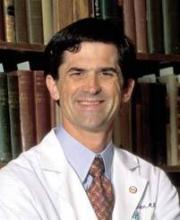While plentiful guidance has been published on how hospitals should diagnose, isolate, transfer, and treat patients with Ebola virus infection or suspected infection, little information is available for the office-based physician.
The Centers for Disease Control and Prevention says that it is developing on a broader set of guidelines that will include primary care physicians and other clinicians working in outpatient practices. But these guidelines have yet to be published, and physicians at both standalone and hospital-affiliated practices are grappling with tough questions regarding isolation, transport to hospitals, and even whom to call first.
In the event of a patient presenting in an office with a travel history and symptoms suggestive of Ebola, "you would certainly do as much contact isolation as you can," said Dr. Kevin Powell, a pediatrician in St. Louis. "Most offices are prepared to do some, and it would reduce the risk markedly."
At that point, "I think the presumption of most doctors was, you call the CDC and say you need help," Dr. Powell added.
"Then we found out that the CDC isn't prepared to give that answer back."
Because an office-based physician will not be able to diagnose Ebola, regardless, Dr. Powell added, there should be “a strong emphasis toward saying that a person who thinks they have Ebola should stay away from an outpatient office and go to a hospital emergency room.”
Health officials in Ohio have advised primary care physicians to consult with any patient with suspected Ebola symptoms by phone, taking information about travel and also about potential exposures within the United States.
Dr. Jack T. Swanson, described a similar approach at the McFarland Clinic in Ames, Iowa. “If a patient calls for a sick appointment, our triage phone nurse will ask if they have been in western Africa or have had any contact with someone with Ebola in the past 21 days. If the answer is yes, they are to go to our emergency room rather than come to our office,” said Dr. Swanson, a pediatrician in private practice.
Some patients with suspected Ebola may arrive at outpatient clinics anyway. One way to establish a front-line response is to have nonclinical registration desk staff ask the first screening question, regarding travel history, Dr. Amy Gottlieb, said in an interview. At her hospital-linked outpatient practice, “If we [identified] someone with travel exposure, we could isolate them in a room and bring in someone who can do the clinical assessment in a private, controlled setting,” said Dr. Gottlieb of the departments of medicine and ob.gyn. at Brown University in Providence, R.I.
Dr. George DeVito, a pediatrician* in Concord, N.H., treats a large number of resettled and refugee families from all around the world. His outpatient practice has been working closely with infectious disease and infection control specialists at their local hospital to craft a clear and careful strategy, he said, that includes screening for any child presenting with fever.
“As we enter flu season, we’re going to be seeing lots and lots more kids with fever, and many of our refugees don’t speak English, so we’re talking through a translator. Many people here may be very fearful of expressing that someone in their family may have had Ebola-like symptoms or a travel history. There are huge issues for us here,” said Dr. DeVito. Nonetheless, as a hospital-affiliated practice, “at least we know who to call. In an isolated private practice, it would be a different story.”
Should a patient present to a clinic, Dr. Carolyn Lopez, president of the Chicago Board of Health said, “the travel history should be obtained and appropriate precautions implemented. The local and/or state health department should be contacted. They in turn should have a plan in place as to which hospital will be involved and how to transport the patient there. Bottom line is that everyone should have a plan, everyone should know their role in the plan and practice the plan so that if and when it is needed, people can implement the plan.”
Some physicians acknowledge that they currently do not have a strategy in place.
“I will be awaiting the recommendations from the CDC,” said Dr. Karalyn Kinsella, a pediatrician in private practice in Cheshire, Conn. “My questions would be how do we transport patients to the hospital? Will the ambulance companies be prepared?”
Dr. William E. Golden, professor of medicine and public health at the University of Arkansas, Little Rock, said that diagnosis and triage might be the easiest task in an office setting. It’s what to do next that’s the hard part. “Offices need guidance on the aftermath,” Dr. Golden said. “Current policy is erratic at best. On the one hand, we are told that asymptomatic patients are not contagious, but now health workers in Dallas are told to stay away from public places for 3 weeks after contact with an Ebola patient. We need consistent clinical leadership, stat.”


